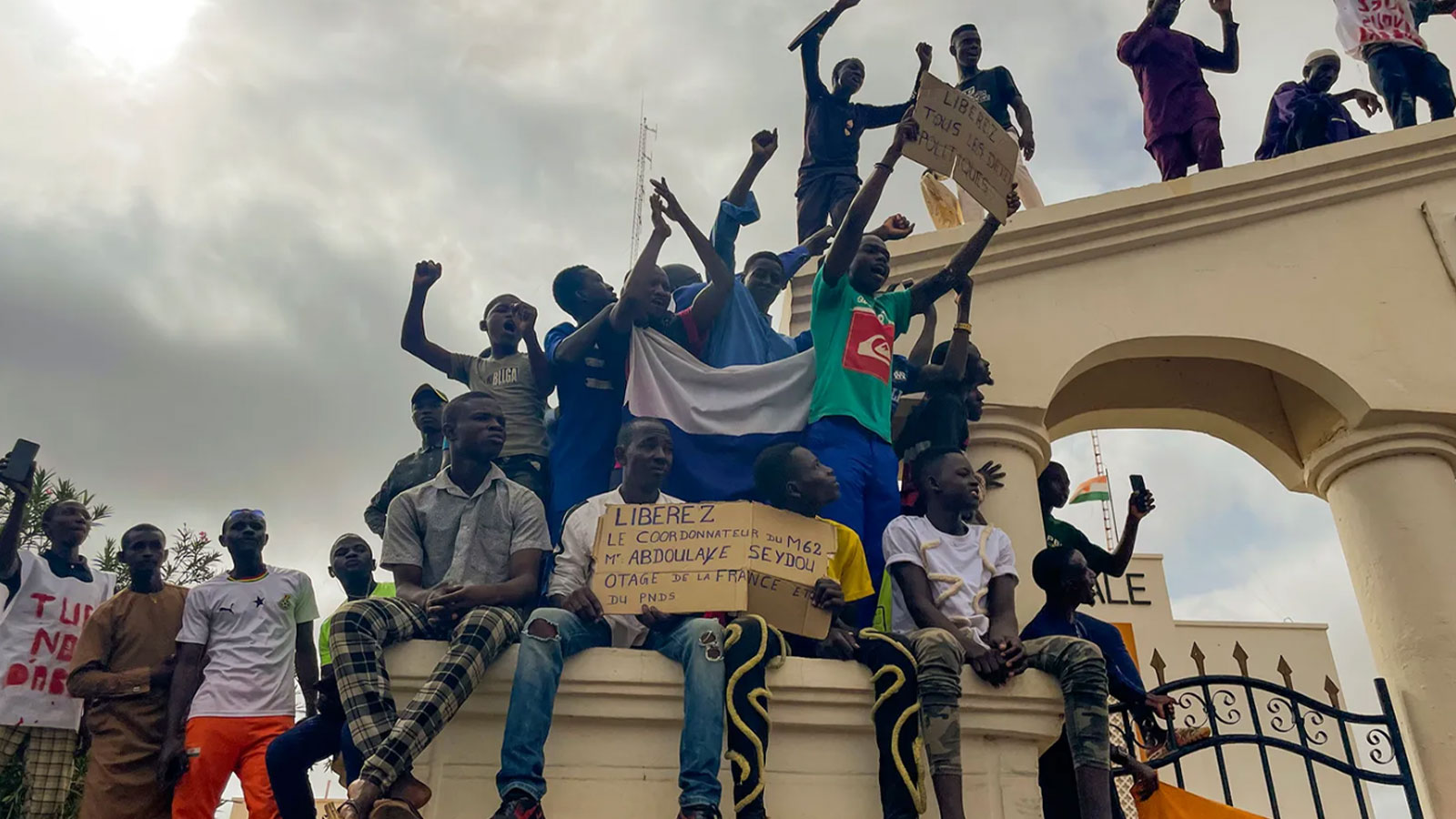The crisis has created a truly geopolitical moment for intra-African politics.
By Howard W. French, Foreign Policy —
For most global observers trying to make sense of recent events in West Africa, the key points of interest follow a story as old as the Cold War: Outside of enormous humanitarian crises, the only events that garner much attention in Africa are contests between big outside powers.
For decades, that mostly meant the rivalry between the United States and the Soviet Union. More recently, during a period when Beijing’s profile on the continent was sharply rising, it was U.S. interests versus China’s. And now, following the coup in Niger, writers have been rushing out analyses about a seesaw battle between Washington and Moscow in Africa’s Sahel region, with the added wrinkle of the shadowy Russian mercenary outfit known as the Wagner Group.
The years may come and go, but the main question asked in the rich world seems to never change: How will the rise of the latest authoritarian government on the block that doesn’t hew closely to Europe or Washington threaten to reduce U.S. or Western influence and power?
As persistent as it is, this pattern of assessments can only continue so long as the writers only think in the short term and fail to ask bigger questions. For starters, that might include looking into why, if Africa supposedly matters so much to Washington (or Europe), it hasn’t built more solid relations with the countries of that continent by now, into most African countries’ seventh decade of independence and nominal sovereignty.
***
As in Niger in the last two weeks, the least hint of a supposedly menacing wind from any authoritarian quarter brings on all kinds of heebie-jeebies for policy people in Washington (and Paris, in this case), as well as for most Western commentators. What they never seem to get around to asking is why the United States (or the continent’s former imperial bosses) has such tenuous relations with African countries in the first place, nor what—let’s stick to Washington for now—the country’s diplomats have been doing on the continent all this time to make the arrival of a new potential partner for an African state seem so disruptive and challenging.
To pursue such questions would invite painful self-scrutiny. Washington has mostly dawdled away the decades in Africa, switching around policy slogans every few years according to the tides of fashion but mostly sticking to two messages for Africans. The first: Don’t look to us for any kind of checkbook help in terms of vitalizing your economies. We wish you well as you pursue something called “public-private partnerships,” which usually mean very little of the former and not so much from the latter, either, unless the private businesses are involved in oil and gas.
The other well-worn theme is, of course, democracy. U.S. policymakers profess to love it in Africa, but they’ve never shown much skill at figuring out how to promote it there—nor, as the Niger coup amply demonstrates, defend it when it comes under attack. Washington spends a fair amount on military assistance in friendly African countries, but this is mostly about protecting U.S. interests, such as the so-called war on terror. As this Wall Street Journal piece shows, this has proved of little help when African democracies come under internal attack.
Let’s look at the threat side of the equation for a moment, though. As China dramatically expanded its influence in Africa beginning in the 1990s, especially accelerating in the early 2000s, did this really come at Washington’s expense, as so many handwringers warned? Very few are the African states that would not welcome much more U.S. (or Western) investment today, however thriving their China ties are. And many of these would also welcome much closer political relations, for that matter, so long as they were respectful. Such things would require change in Washington, though, and there is no hint of that on the horizon.
This makes all the talk about Russian gains in the Sahel and, more broadly, in Africa sound all the shallower. Yes, it is true that Moscow or Wagner could conceivably take over operational control of some of Washington’s drone bases in this very poor and generally sparsely inhabited region of Africa—and even possibly win some mining business there, too. But if this hasn’t happened with a much more thriving and dynamic China, which but the most desperate African countries would like to lash their medium- or long-term fortunes to Russia?
One quick measure of an answer came from the attendance at the 2023 Russia-Africa forum in St. Petersburg, which took place as the Niger coup was unfolding. According to one recent assessment, African participation at the head-of-state level was significantly lower than at the first such summit in 2019. It was also lower than at the U.S.-Africa summit last December.
***
All of this is to say that most of the reflexive talk about which outside power is winning or losing an edge in Africa is noise largely devoid of real significance. And to the extent that the United States gets worried, it only has itself to blame for being so unambitious in its engagement with the continent for so long. This reflexive focus has another negative effect, though. It prevents outsiders, and oftentimes even Africans themselves, from seeing what truly is significant about events surrounding the Niger coup.
The real action isn’t as spectacular as an international summit or headlines about great-power rivalry, and yet the most important politics in this and many other recent African crises are squarely African politics. These often draw upon deep historical currents that too few bother to take seriously. They also highlight the realities of state capacity and, indeed, state-making in Africa like little else. Finally, they point to an unavoidable reality: Africans will ultimately make or break their continent’s geopolitical landscape—and foreign interlopers, however muscle-bound they may appear, are ultimately fated to play a secondary role.
Witness, for instance, the visit to Niger shortly after the coup of the sultan of Sokoto, Muhammadu Abubakar—a spiritual leader of Nigeria’s Muslim community—as part of a mediation delegation from the Economic Community of West African States (ECOWAS). The sultan is revered and even followed by tens of millions of people in Nigeria as well as the neighboring countries of Niger and Chad, some of whom pay him tribute.
Today’s Sokoto state, located in northwestern Nigeria, and its sultan are the remnants of an indigenous caliphate that predated colonial rule and continues to hold influence and a grip on people’s imaginations and identities. That ECOWAS chose to send Abubakar to try to mediate Niger’s crisis shows that Africa’s own past, traditions, and many of the institutions that survived colonial rule retain more relevance in the lives of the continent’s people than many, especially outsiders, realize.
I have seen similar periods of intense intra-African geopolitics during my time writing about the continent. Nigeria’s leadership of peacekeeping efforts to help end the violence in deadly and disastrous wars in Liberia and Sierra Leone in the 1990s is one example. A conflict in post-Mobutu Zaire (Congo), which I also reported on from the ground, drew in so many of that giant central African country’s neighbors as rivals that it became known as Africa’s World War.
Niger’s coup has created a truly geopolitical moment for Africans—a time when the United States, Russia, France, and China became less immediately important than Africans themselves.
This is best seen in the role of Nigeria, the region’s largest country by far, whose new president, Bola Tinubu, happens to be the sitting head of ECOWAS, the region’s most important interstate political and economic organization. Tinubu and ECOWAS loudly insisted on the restoration of Niger’s overthrown leader as well as its democratic system. And it is not because the deadline they set for that to happen came and went (probably because several West African states vowed to defend Niger’s coup leaders) that this did not seem to matter.
Africans are feeling their way forward in the Sahel. This may seem halting, but it is indispensable for the region’s, and indeed Africa’s, future that Africans increasingly take charge of their own processes—creating their own bylaws, establishing their own guardrails, and brokering their own diplomatic as well as, where need be, military solutions.
I want to suggest an idea as old as the movement that led to independence on the continent starting with leaders like Kwame Nkrumah: African countries won’t begin to have meaningful sovereignty, and perhaps not be very consequential states at all, until they become the stewards and custodians of their own regions. This idea also draws on a venerable school in political science pioneered by the late social theorist Charles Tilly. His most cited nostrum was that war makes states.
Those who take this as a suggestion that African countries must fight each other as an obligatory step toward the development of capable states, as the European nations that Tilly studied once did, will have misunderstood me. What I mean, rather, is that working out an ever-deeper sense of mutual interest in regional political development, stability, and economic cooperation through deeper statecraft and engagement is going to be required of African nations if they are to get anywhere. And relying on outsiders to play front-line roles at the first sign of trouble will always be inimical to that.
Source: Foreign Policy
Howard W. French is a columnist at Foreign Policy, a professor at the Columbia University Graduate School of Journalism, and a longtime foreign correspondent. His latest book is Born in Blackness: Africa, Africans and the Making of the Modern World, 1471 to the Second World War. Twitter: @hofrench
Featured image: Supporters of Niger’s ruling junta gather for a protest in Niamey, Niger, on Aug. 3. SAM MEDNICK/AP















